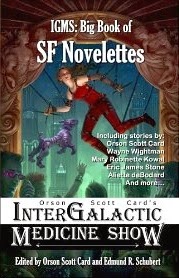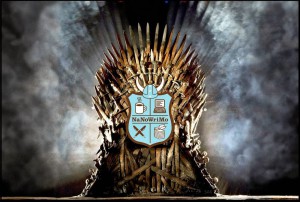I’m a super-slow writer.
At least I’m pretty sure I am.
Oh, there have been times where I’ve cranked out the words; those times when I’ve been on a roll, writing some part of the story that I’m especially excited about, or rushing with excitement toward the end of a story, or just tapped into the Main Source and channeling it all onto the page like a fire hose of words. And of course there have been times when pressure and circumstances have forced me to write more and faster than I ever have before (Writers of the Future was a good example of this, when I wrote an 8000-word story in the space of 24 straight hours).
But mostly I’m slow. How do I know this?
Last month, the Stop-Watch Gang held our annual writer’s retreat weekend and it was a very productive weekend for all involved. But ‘productive’ is a relative description. Just how productive are we talking? Let’s put that in perspective: your average SF paperback tends to be in the 80,000-100,000 word range, so let’s use that as our metric. Fully THREE of us wrote 1/10th of a novel over the course of the sixteen writing hours we had that weekend, and two others we not far off that pace at 6000-7000 words.
Was I one of those five? I was not. Where did I rank? Yeah, that’s me second from the bottom (and Richard probably would have beat me if he didn’t stop after hour 6 because his carpal tunnel was acting up).
Don’t get me wrong: it was still super-productive for me. 3100 words is a lot of word for me, especially over the course of 16 hours. But its not 1/10th of a novel, by any means. (You’ll note that we took a two-hour dinner/Star Wars pinball tournament break on Saturday night, and people STILL kicked my ass…)
Kevin J. Anderson‘s advice to us at Writers of the Future was “be prolific.” Suffice to say it’s advice I’ve tried but failed to take to heart. Or at least to keyboard. But no more!
You see, Kevin records his chapters into a handheld recorder as he hikes and then has someone transcribe them for him, whereupon he edits them and sends them off to various publishers. Seems to work wonders as the guy publishes a dozen or more books each year. Why not give it a shot myself.
Recently, when I upgraded to a new laptop I decided to finally pick up Dragon Dictate for Mac (on sale!) I can’t afford to pay someone to transcribe my babbling, but I sure can talk faster than I can type! So if I can force my computer to do the transcription…Hell, I talk to myself all the time anyway–I might as well harness that to some useful end!
This morning, basically out of the box with almost no training of the program to recognize how I speak, I was able to very accurately (like 98% accurately) dictate 1400 words of story in under an hour using Dragon Dictate. That’s about 2.5x more than I would normally get written in an hour (yes, I’m otherwise THAT slow) and easily three-days work the way things have been going for me lately, and for ages, really. 1400 words in a single day would be a banner day for me–but to do it in a single hour? I may actually now finish my novel by the end of the year…and at this pace write another one, too!
I don’t use it to do all the punctuation–I could, but speaking your punctuation feels pretty unnatural, at least at this point–and I figure that’s easy enough to clean up when I do revisions. That’s where the fun is for me, anyway. I don’t like writing; I like having written.
The key in using Dragon Dictate, for me, is speed. To get those words down as fast as I can; to get what Tim Powers called our “first approximation draft” down before my inner editor kicks in, and I hem and haw endlessly about the sentence I have in my head before writing down essentially the sentence I started with. Speaking is so much better for this than typing: I think it and say it almost at the same time, and there it is on the screen second later! Typing is truthfully an added step: I have to think something, tell my fingers to fine the right keys, type it, and then verify I wrote the right thing. This is just disintermediation! People call the first pass the “vomit draft”, so here it comes!–just through this little headset mic, instead of a keyboard.
Do I want to write glorious, evocative prose? Of course! Is that going to happen in the first draft, whether I type it with my fingers or speak it into a transcription program? Hell no!
Writing is rewriting, and that’s where most of the pretty will come in anyway. For that I’ll use the keyboard; for that I’ll agonize over word choice, phrasing, placement, etc. For now, I just need it DONE.
Because before I can revise, I need a complete first draft. And if I can speak-write 1400 words of prose fiction in under an hour that complete first draft just got a whole lot closer. Like “done in a couple of months” close, instead of well into 2014.
And imagine if I have TWO HOURS each day! And what if I can get better at dictating and can do 2000 or 2500 words an hour? And when I’m done the novel, think of how many short stories I can crank out…
– S.





